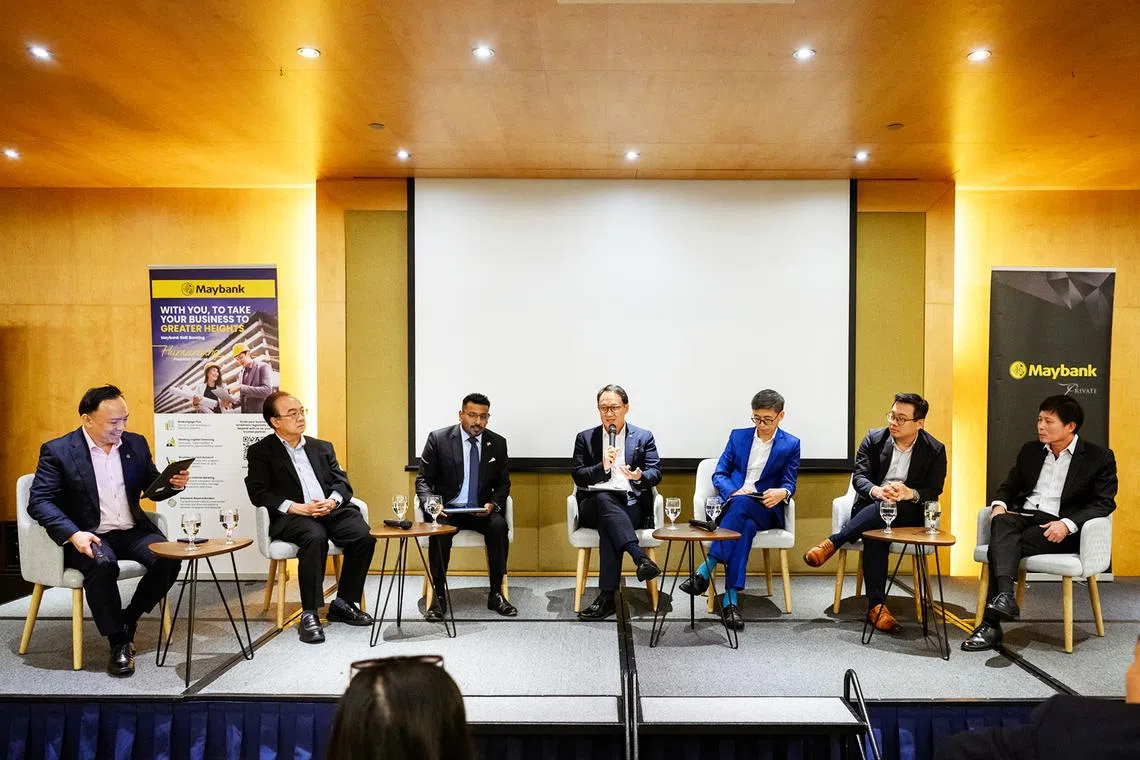Data centres, renewable energy: Johor’s growing industries offer growth avenues for S’pore firms
Faster cross-border travel expected by 2026 can boost economic opportunities to the southern Malaysian state, say speakers at a recent Maybank conference
Jolene Natasha Limuco
Singapore and Johor’s already strong business ties are poised for further growth as multinational corporations diversify their supply chains, and new opportunities emerge in the southern Malaysian state of Johor.
These were some of the key points from the Johor-Singapore Access conference held on July 8 at the JEN Singapore Tanglin. The event attracted around 160 attendees, reflecting strong business interest in Johor following the January announcement of the planned Johor-Singapore Special Economic Zone (JSSEZ).
Already, more than 300,000 people commute daily from Johor to Singapore via the Causeway and Second Link. This number is likely to rise when the Johor Bahru–Singapore Rapid Transit System (RTS) Link is completed by the end of 2026, significantly reducing travel time.
“Singapore as a global financial hub with advanced manufacturing capabilities, complemented by Johor’s access to competitive costs, energy resources and abundant land for example, will attract fresh foreign direct investments from MNCs to the region,” said Alvin Lee, country chief executive for Maybank Singapore.
Lee added the Singapore-Johor relationship goes beyond infrastructure. Many Singaporeans have relatives in Malaysia, and the two countries share deep cultural ties.
“Singapore as a global financial hub with advanced manufacturing capabilities, complemented by Johor’s access to competitive costs, energy resources and abundant land for example, will attract fresh foreign direct investments from MNCs to the region.”
Alvin Lee, country CEO, Maybank Singapore
During the conference, Chua Hak Bin, regional co-head, Macro Research at Maybank Investment Banking Group, identified several catalysts that could accelerate economic integration between Singapore and Johor in the coming years.
Navigate Asia in
a new global order
Get the insights delivered to your inbox.
One of the catalysts is the growing US-China strategic rivalry, which has prompted companies to diversify supply chains and reduce their dependence on China. For instance, China’s share of US imports dropped to 14 per cent in 2023 from 21 per cent in 2018. Conversely, South-east Asia’s share of US imports rose to 10 per cent from 7.3 per cent during the same period.
Chua also highlighted opportunities in renewable energy as another catalyst, noting Singapore’s plan to import up to 30 per cent of its energy needs by 2035, mainly low-carbon electricity transmitted via power grids. Currently, about 95 per cent of Singapore’s electricity is generated locally from imported natural gas.

He also identified Johor’s emergence as a leading destination for data centres, crucial for businesses adopting increased digitalisation and artificial intelligence. Johor’s abundance of land, electricity and water makes it ideal for such facilities. Maybank estimates Johor will attract US$3.8 billion worth of investments in data centres this year.
New growth drivers
Another speaker, Samuel Tan, executive director of KGV International Property Consultants, focused on the potential for enhanced connectivity between Singapore and Johor through waterways.
Johor’s existing ports with CIQ facilities, already linking the state to Batam, could be further utilised to streamline the movement of visitors and cargo between Singapore and Johor. This would strengthen the city-state’s connections with not only Johor but also the Riau Islands of Indonesia.
Tan said authorities should consider providing roll-on roll-off ferry services that will allow vehicles to be driven directly onto ships and disembark upon arrival, which is what the Indonesian government is keen to establish between Batam and Tanjung Belungkor near the popular resort of Desaru in Johor.
In January 2024, Singapore and Malaysia signed a memorandum of understanding to establish the JSSEZ, encompassing parts of Johor.
Plans include a one-stop business/investment service centre streamlining application processes for licenses and approvals required of Singaporean businesses to set up shop in Johor. Additionally, a passport-free QR code clearance system will be implemented to expedite immigration clearance on both sides.
In April, Malaysian Prime Minister Anwar Ibrahim described the JSSEZ as a “game changer” for Malaysia’s economic growth and social strategy with Singapore.
Malaysia has said it is ready to unveil details of the JSSEZ in September during the 11th Malaysia-Singapore Leaders’ Retreat, suggesting that plans for the zone are close to fruition.
“At Maybank, we see ourselves as powering the continued growth of the Malaysia-Singapore corridor through facilitating cross-border business services, solutions and digital networks to support our clients’ business needs,” said Maybank’s Lee.
“Maybank will have a significant role to play as the Malaysia-Singapore corridor grows and as the JSSEZ becomes a closer reality,” he added.
How Singapore SMEs can seamlessly expand in Johor
Small and medium enterprises (SMEs) that are interested in setting up operations in Johor, or have questions about the upcoming JSSEZ, can turn to Maybank for advice. Maybank Group is Malaysia’s largest bank with 38 branches in Johor and Maybank Singapore has 18 branches in Singapore. Here are some ways the bank can help businesses in their cross-border expansions.
• SMEs can attend monthly educational talks that the bank holds for Singapore businesses in partnership with the Malaysian Investment Development Authority (MIDA).
• Cross-border financing solutions are available for Singapore companies seeking to purchase commercial and industrial properties. Asset and project financing is provided for companies in Singapore under the Enterprise Financing Scheme with Enterprise Singapore.
• For those in the food business, a suite of tailored financial services is offered, including Halal facilitation that provides comprehensive guidance on Halal certification and market access regionally.
• Using the Maybank Overseas Transfer service, Maybank Singapore’s SME customers, as well as retail customers, can transfer funds or make payments at competitive exchange rates to over 50 banks and non-financial institutions in Malaysia, including Touch ‘n Go eWallets, on the Maybank2u SG (Lite) app and Maybank2u Online Banking.
In addition, customers who hold accounts in both Singapore and Malaysia enjoy instant fund transfer services at competitive exchange rates with zero fees.
For more information on Maybank’s services for expanding your business beyond Singapore, visit maybank.sg/beyondborders

Share with us your feedback on BT's products and services
